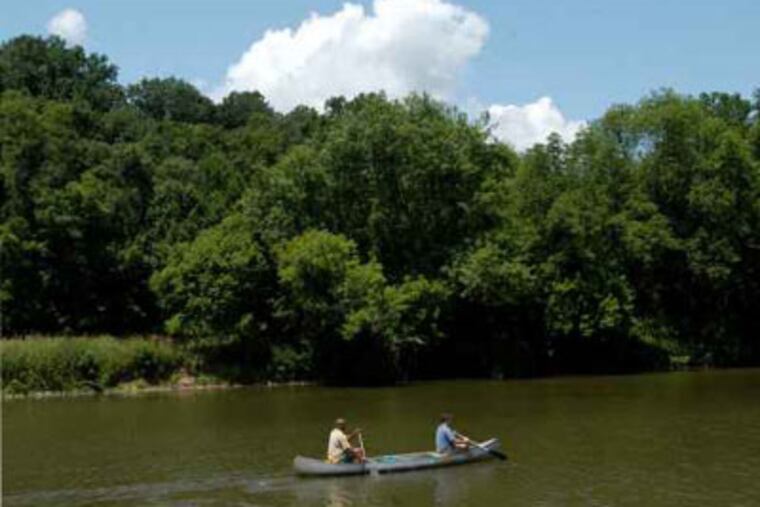Protecting national parks in Pa. and NJ should be priority for lawmakers | Opinion
The Land and Water Conservation Fund has invested over $309 million in Pennsylvania, protecting hallowed sites including Valley Forge, Gettysburg, the Flight 93 National Memorial, Nockamixon State Park, and Tyler State Park.

The writer, historian, and outdoorsman Wallace Stegner called our National Parks “America’s best idea.” One need only spend a moment in New Jersey or Pennsylvania to see the truth in that. Yet, despite our land’s undisputable beauty, nobility, and significance, our public lands are in grave danger if Congress fails to provide America’s most important conservation program, the Land and Water Conservation Fund (LWCF), with the funding it needs.
For over 50 years, LWCF has made the difference in protecting threatened properties in our national parks, forests, and wildlife areas even as it has fueled critical conservation and recreational opportunities at the state and local level. After years of short-term reauthorizations, and a brief expiration, we and our colleagues voted overwhelmingly to permanently authorize LWCF earlier this year, ensuring that it will be around for future generations. While that was a big step forward, annual funding still is not assured – and that is something we are working together to change.
LWCF has been around for more than half a century, but in that time more than half its intended funding has been redirected. As a result, over $22 billion that should have been invested in outdoor recreation and conservation have gone somewhere else. Diverting these LWCF funds for non-conservation purposes short-changes our communities and the public lands we all love. It also deals a huge blow to our economy.
Investments in America’s natural infrastructure – particularly increasing access to public lands for outdoor recreation – are a key driver of the economy. Outdoor recreation is among our nation’s largest economic sectors, thriving even when the broader economy has suffered. According to the Outdoor Industry Association, hunting, fishing, camping, hiking, paddling and other outdoor recreation activities contribute $887 billion annually to the U.S. economy, providing jobs for 7.6 million hard-working Americans. These are honest, well-paying jobs that cannot be outsourced or exported.
Beyond those statistics, the array of places that depend on LWCF is truly staggering. In New Jersey alone, LWCF has invested more than $350 million in historic sites and natural areas including the Cape May National Wildlife Refuge, which provides access for hunters, anglers, and other sportsmen and -women. Similarly, LWCF has invested over $309 million in Pennsylvania, protecting hallowed sites including Valley Forge, Gettysburg, the Flight 93 National Memorial, Nockamixon State Park, and Tyler State Park.
LWCF is able to meet these and other critical conservation priorities, in our states and all across America, without using a dime of taxpayer dollars. It is funded entirely from national oil and gas royalties, under the sound principle that the depletion of one natural resource we all own should be offset by the permanent protection of other resources we all need.
Conservation of America’s irreplaceable public lands is broadly supported throughout our nation and across all geographies, demographics, and party lines. These iconic public landscapes are our birthright as citizens. They are more than just beautiful places; they are a part of our shared identity, an integral part of what it means to be an American.
Recognizing that national imperative, huge bipartisan majorities in Congress support LWCF. Given that support – and knowing that the places we fail to protect today will be lost tomorrow – we believe that now is the time to provide it with the permanent, dedicated funding necessary to safeguard our public lands and grow our economy.
That is why we are calling on our colleagues in Congress to join us in supporting our bill, The Land and Water Conservation Fund (LWCF) Permanent Funding Act of 2019. Passing this legislation would ensure that the full $900 million in offshore energy royalties that comes in every year to the LWCF account will actually go out to LWCF projects and grants for conservation and recreation at the national, state, and local level.
It’s a simple concept, but the stakes are high. Without dedicated funding, the promise of LWCF and all its many benefits to our communities remain at risk. By taking the next step and securing LWCF funds for the future, we can indeed meet our obligations to America’s public lands and can truly do justice to “America’s best idea.
Jeff Van Drew is the U.S. Representative for New Jersey’s 2nd congressional district. Brian Fitzpatrick is the U.S. representative for Pennsylvania’s 1st congressional district.